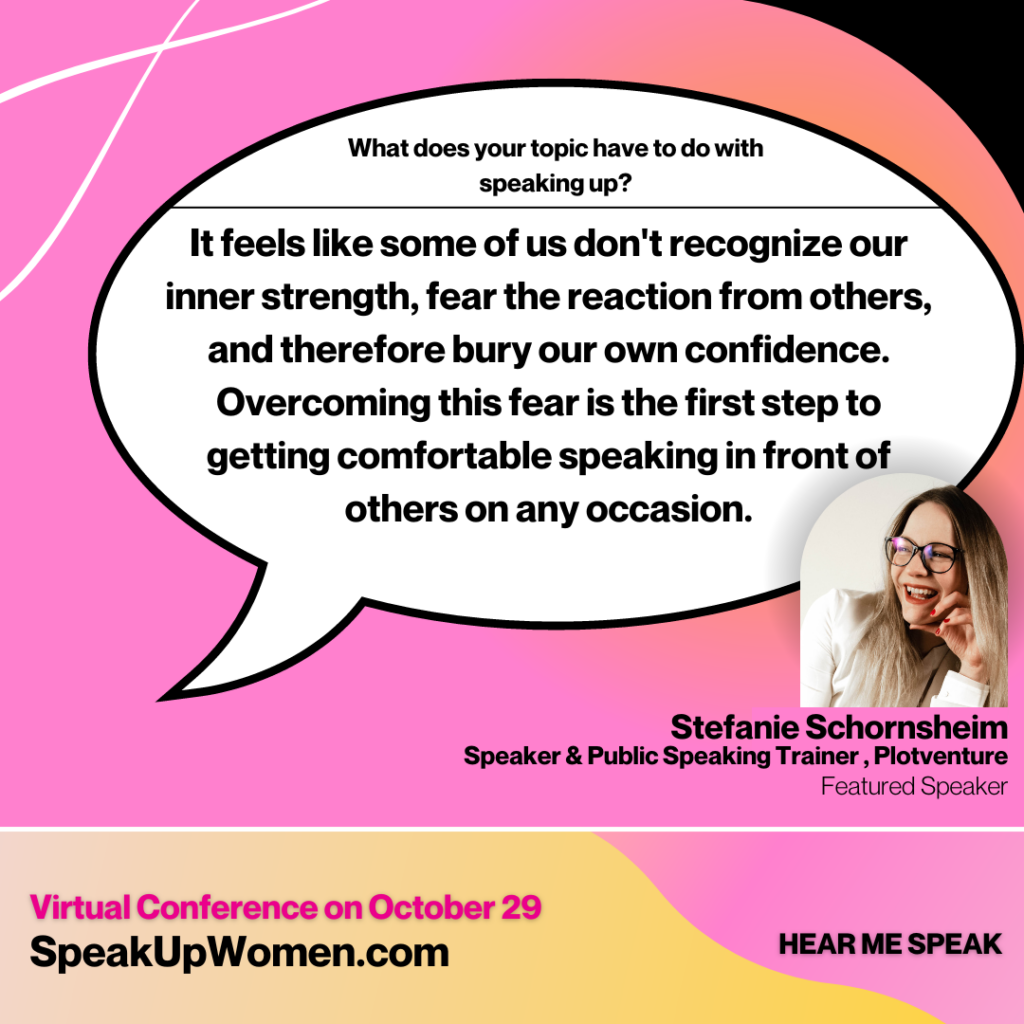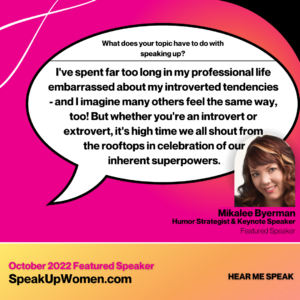Do you know how it feels to fear public speaking? It’s when you get very nervous, start sweating, or even feel paralyzed and get a panic attack when stepping in front of an audience or camera.
Good news: You are not alone! Suffering from public speaking anxiety is more common than the fear of death. I had it too. That’s why I want to share how exactly I overcame speaker’s anxiety and now enjoy speaking in front of audiences.
Shaking, Crying & Panic Attacks
I used to be stunned when I knew that I had to step in front of an audience. This started back in school when we had to recite poems in front of the whole class. I would sweat, shake, my breathing got harder, and I wanted to cry and run away. Later in life, I suffered from a severe anxiety disorder with panic attacks. For years, I wasn’t able to “function” properly.
During that time, I googled the hell out of the internet for advice on how to REALLY overcome speaker’s anxiety. I always found the same nice-sounding sentences: It’s not about you; it’s about your content. Just be prepared and know your stuff. Take some deep breaths and make eye contact.
All of those are true and important, but I was missing HOW EXACTLY that worked! What are the steps to take to overcome speaking shyness? Today, I have the answers.
Let’s unravel the three main realms: Preparation, Practice, and Presentation.
Overcome Speaking Anxiety With Good Preparation
Everything you know about and around your presentation, talk, or pitch will lower the fear of the unknown and help reduce your anxiety.
First, you need a topic for your presentation that you are excited about. If you have to talk about something you’re not excited about yet, think about the impact this topic will have on other people and create excitement around the idea of supporting others. This gives your spotlight moment a purpose, and doing something purposefully naturally lowers anxiety.
While creating your presentation, think about the room you’ll be speaking in. What’s the tech setup? Who can you contact for help? Do you need to bring anything? Will there be cameras? Find out everything about the situation to avoid being surprised when you need to hold the talk.
If you use slides for the presentation, be sure to know what will pop up every time you click “next slide.” Double-check that the target audience will understand your slides. Are you using words they know? If you have any technical terms they might be unfamiliar with, explain them or use simpler words.
If possible, have your talk written down as bullet points on a sheet of paper that you can take with you on stage. Knowing that you have a backup in your pocket if you forget something important is calming.
Never Skip Practice
The more routine you have in executing the talk, the easier it will get; but “practice” does not only mean rehearsing your presentation repeatedly. It’s also about training your mind and body for the stage.
When you start to get nervous, your brain might bring up the worst possible outcome ideas or negative memories from who knows when. This is something you can counter! How exactly depends on your character. For me, it was writing meditation.
How I used writing meditation to overcome my fear
This open-eyed meditation is really about clarity and intention. Write down all the junk that comes to mind when you start to worry about your talk. What happens if you forget what you want to say? Write down your exact list of fears. What happens when the tech does not work? Write down everything that can go wrong. When you have the list of your worst-case scenarios, start rephrasing each one into something positive. Then, create solutions to overcome your speaker’s anxiety.
For example:
“I forget what I want to say?” -> I will take a moment to look at my notes and continue where I left off. The talk is not about remembering every single word. I just want the audience to get the information.
“The tech does not work, and no one sees my fancy slides!” -> I prepared and rehearsed the presentation. I can still talk about the content without the slides.
If you think there will be a case when you will not be able to handle yourself, think about who can help you. Is there anything you can do in advance to prevent your worries from happening? Be prepared with a plan for who is onsite to support you.
Breathing exercises to help calm you down
Besides writing meditation, you can do some powerful breathwork to calm down before a talk. There are many good exercises out there; here is my favorite:
- Take a deep breath in while you count to four in your head.
- Exhale for six counts.
- Repeat.
Simple and effective. It works best when you practice it daily for a couple of minutes. Then your body gets used to this calming method, and the comfortable effect kicks in faster whenever you need it.
Presentation Day
Before you go on stage, make sure to check the following things off your list:
- Choose your outfit: Avoid big prints or text on the clothes because those distract the audience. Make sure the outfit is comfortable and won’t show sweat stains – stage lights are usually quite hot, so you will likely start sweating.
- Eat something light or have a snack (prevent your stomach from growling)
- Warm up your voice: humming in different pitches (end with low), tongue twister, stretch face muscles by opening your mouth as wide as possible.
- Repeat powerful affirmations in your head or say them to yourself while looking in the mirror. Examples: “I enjoy talking about XYZ.” “It is my responsibility to share my knowledge,” or “I am calm, healthy, strong, and happy.”
- Go to the restroom.
- Smile as big as you can for 60 seconds. This will release happy hormones.
- Take a sip of water before you go on stage, or take a glass of water to the talk.
When you step in front of the audience or camera, put on your happy face to win the audience. They want you to succeed. They showed up for the talk because they are interested in the information you’re about to give them.
Concentrate on this: You are the expert.
Overcoming your speaker’s anxiety takes a commitment. It would be best if you tried different techniques and exercises until you find what helps you to get through the fog. Just remember that excuses will slow you down and stop you from making progress.
Learn more about Stefanie and her journey at the Speak Up Women Conference.
If you enjoyed this article, join our newsletter and community at SpeakUpWomen.com to receive updates about new articles and events and our upcoming conferences.





